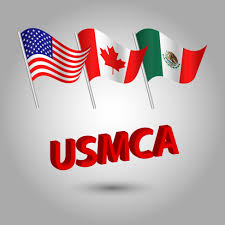US, Mexico, Canada sign USMCA trade deal: USTR 13/12/2019 – Posted in: Daily News – Tags: North American Free Trade Agreement

United-States-Mexico-Canada-Agreement-USMCA
United States-Mexico-Canada Agreement (USMCA)
For: Preliminary & Mains
Topics covered:
- About the agreement (United States-Mexico-Canada Agreement)
News Flash
The US has reached an agreement with Mexico and Canada (United States-Mexico-Canada Agreement- USMCA) in the renegotiation of the North American Free Trade Agreement (NAFTA).
- The trio has reached an agreement to benefit American farmers, ranchers, and agribusinesses.
- The agreement will enable food and agriculture to trade more fairly, and to expand exports of American agricultural products.
Highlights of the United States-Mexico-Canada Agreement
- Creating a more level playing field for American workers, including improved rules of origin for automobiles, trucks, other products, and disciplines on currency manipulation.
- Benefiting American farmers, ranchers, and agribusinesses by modernizing and strengthening food and agriculture trade in North America.
- Supporting a 21st Century economy through new protections for U.S. intellectual property, and ensuring opportunities for trade in U.S. services.
- New chapters covering Digital Trade, Anticorruption, and Good Regulatory Practices, as well as a chapter devoted to ensuring that Small and Medium-Sized Enterprises benefit from the Agreement.
Key Achievements
- America’s dairy farmers will have new export opportunities to sell dairy products into Canada. Canada will provide new access for United States products including fluid milk, cream, butter, skim milk powder, cheese, and other dairy products. It will also eliminate its tariffs on whey and margarine.
- The top priority for America’s dairy industry in this negotiation has been for Canada to eliminate its program that allows low priced dairy ingredients to undersell United States dairy sales in Canada and in third country markets. As a result of the negotiation, Canada will eliminate what is known as its milk classes 6 and 7.
- For the first time, the agreement specifically addresses agricultural biotechnology to support 21st century innovations in agriculture. The text covers all biotechnologies, including new technologies such as gene editing, whereas the Trans-Pacific Partnership text covered only traditional rDNA technology.
- Building on NAFTA, the United States, Mexico, and Canada agreed to work together in other fora on agriculture matters, improve transparency and consultations on matters affecting trade among the countries.
- Canada has agreed to grade imports of United States wheat in a manner no less favorable than it accords Canadian wheat, and to not require a country of origin statement on its quality grade or inspection certificate. Canada and the United States also agreed to discuss issues related to seed regulatory systems.
- In the Sanitary and Phytosanitary (SPS) Measures chapter, the United States, Mexico, and Canada have agreed to strengthen disciplines for science-based SPS measures, while ensuring Parties maintain their sovereign right to protect human, animal, and plant life or health.
- The Parties agreed to provide important procedural safeguards for recognition of new geographical indications (GIs), including strong standards for protection against issuances of GIs that would prevent United States producers from using common names, as well as establish a mechanism for consultation between the Parties on future GIs pursuant to international agreements.
- Mexico agreed to not restrict market access in Mexico for U.S. cheeses labeled with certain names.
- The United States, Mexico, and Canada agreed to non-discrimination and transparency commitments regarding sale and distribution, and labeling and certification provisions to avoid technical barriers to trade in wine and distilled spirits.
- To meet technical regulations and standards related to prepackaged food and food additives, governments may require information from companies relating to the companies’ proprietary formulas.
Source: USTR
READ MORE DAILY NEWS
- Climate Change Performance Index 2019
- The Constitution (126th) Amendment Bill, 2019
- The Code on Social Security, 2019
- ISRO launched RISAT-2BR1
- Human Rights Day
- Human Development Index Report 2019
- 15th Finance Commission Report
- KALIA (Krushak Assistance for Livelihood and Income Augmentation) scheme
- Genetic study of clownfish population
You are on the Best Online IAS preparation platform. You are learning under experts.
We are present on Facebook- Diligent IAS, LinkedIn- Diligent IAS, YouTube- Diligent IAS, Instagram- Diligent IAS. Get in touch with us.
